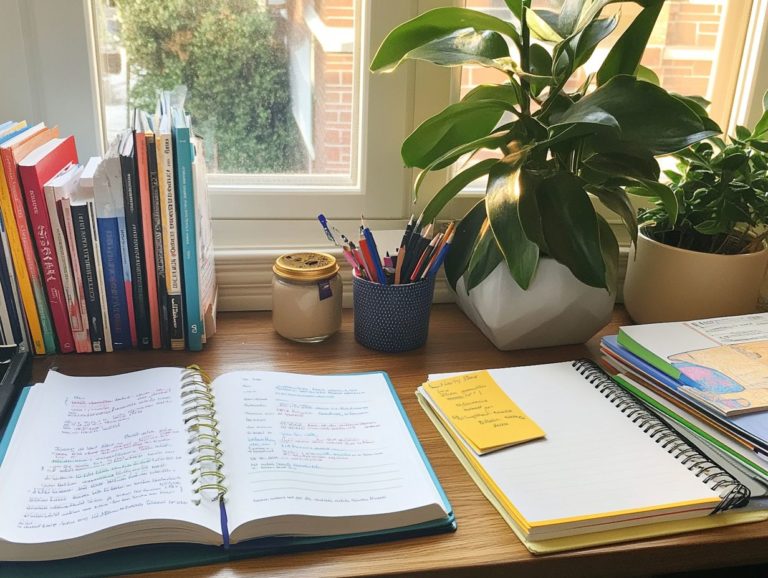what is the role of practice tests in preparation?
In your journey of learning and exam preparation, practice tests are essential. They reinforce your knowledge, build your confidence, and help alleviate anxiety.
This article delves into the various types of practice tests available and provides valuable tips on how to utilize them effectively for optimal learning and retention.
You will discover the advantages of integrating practice tests into your study routine. This enables you to craft a balanced approach that enhances your understanding and elevates your performance.
Get ready to unlock your full potential now!
Contents
- Key Takeaways:
- The Importance of Practice Tests
- Types of Practice Tests
- How to Use Practice Tests Effectively
- Benefits of Practice Tests
- Incorporating Practice Tests into Your Study Schedule
- Frequently Asked Questions
- What is the role of practice tests in preparation?
- How do practice tests help in test-taking strategies?
- Can practice tests improve overall performance in exams?
- How often should practice tests be taken?
- Are practice tests only beneficial for standardized exams?
- Are there any tips for taking practice tests?
Key Takeaways:

Practice tests are crucial for exam preparation as they help identify areas of strength and weakness, allowing for targeted studying.
There are various types of practice tests available, including different formats and styles, catering to diverse learning preferences.
To make the most of practice tests, students should use them strategically by setting specific goals, analyzing results, and adjusting study methods accordingly.
The Importance of Practice Tests
Practice tests are invaluable assets on your path to academic success. They provide a structured and effective means of preparing for standardized assessments like the SAT, GRE, and ACT.
They help you get used to the exam format and enhance your memory retention and test-taking skills while helping you identify and address knowledge gaps. This process significantly boosts your confidence.
Mimicking real exam conditions helps you prepare effectively. Practice tests act as essential tools that level the playing field across various learning backgrounds, ensuring you have access to effective strategies for mastering subject-specific content.
Why Practice Tests are Essential for Preparation
Practice tests are critical for your test preparation journey. They offer valuable feedback on your progress while aiding in setting achievable goals.
By simulating the actual testing environment, these assessments empower you to refine your time management skills and cultivate the confidence you need.
They employ effective learning strategies like retrieval practice. Recalling information not only helps reinforce memory retention but also strengthens your understanding.
Integrating these practice tests into your study routine allows you to pinpoint your strengths and weaknesses, guiding you to tailor your preparation effectively.
With these assessment tools, you enhance your critical thinking and problem-solving skills, essential not just for passing the test, but for achieving lasting academic success.
Types of Practice Tests
You will find a variety of practice tests designed specifically for students. Each one aims at boosting your exam readiness and helping you become comfortable with the test format.
These tests range from simulated exams to subject-specific assessments and practice questions that encompass a broad spectrum of topics and difficulty levels.
By engaging with these diverse practice assessments, you can pinpoint your strengths and weaknesses, ensuring you are thoroughly prepared for the actual exam.
Different Formats and Styles

Practice tests come in various formats, such as multiple-choice questions, essays, and practical scenarios that closely replicate actual exam conditions. Each format presents unique advantages tailored to different study styles.
For instance, multiple-choice questions sharpen your quick recall and critical thinking skills, while essays foster a deeper understanding and articulation of concepts.
Engaging with practical scenarios immerses you in real-world applications, enhancing your problem-solving abilities. By analyzing the results from these assessments, you can pinpoint your strengths and weaknesses, allowing you to customize your study plans effectively.
This data-driven approach not only streamlines your time management but also assists in setting realistic goals, ensuring your preparation and performance evolve in tandem toward success.
How to Use Practice Tests Effectively
To fully harness the advantages of practice tests, you should embrace effective test-taking strategies that emphasize proper time management and retrieval practice.
This approach will ensure you have a productive learning experience, allowing you to optimize your study efforts and enhance your retention of the material.
Tips for Maximizing Learning and Retention
To enhance your memory retention and overall learning potential, you can employ specific strategies that maximize the effectiveness of practice tests.
Integrating regular practice tests into your study schedule creates a structured approach for consistent material review. This method reinforces your knowledge and highlights areas needing improvement.
For example, setting aside dedicated time each week for practice tests can significantly boost your confidence and readiness for real exam situations. Continued engagement with the material through these evaluations helps you grasp concepts thoroughly and apply them effectively during assessments, translating to improved performance.
Benefits of Practice Tests
Practice tests offer a wealth of advantages crucial for your academic success.
They enhance your test performance and foster confidence through a well-structured learning experience.
Engaging with these assessments allows you to identify strengths and weaknesses, equipping you with the tools to excel.
Enhanced Understanding and Performance

One standout benefit of practice tests is how they enhance your understanding and performance by pinpointing knowledge gaps and reinforcing effective strategies. This assessment method illuminates areas needing improvement and aligns with educational psychology, particularly the process of recalling information to strengthen memory.
When you engage in recall exercises, you strengthen the neural connections tied to the material, leading to more robust long-term retention. Regular exposure to practice tests nurtures a growth mindset, encouraging you to see challenges as opportunities for improvement.
Consequently, individuals who routinely incorporate these assessments often experience heightened confidence and engagement, translating into better academic outcomes.
Reduced Test Anxiety
Practice tests are game-changers in your study routine, alleviating test anxiety by familiarizing you with exam conditions and boosting your confidence.
By simulating the pressure of real test scenarios, these assessments provide an invaluable opportunity to gauge your knowledge and pinpoint areas for improvement. This familiarity can significantly reduce the mental stress associated with exam day.
Engage with a variety of preparation resources such as online quizzes, study groups, and review guides to further enhance your understanding and retention. Craft a study schedule that includes regular practice tests spaced thoughtfully throughout your study period to maintain a steady pace and avoid last-minute cramming.
Incorporating Practice Tests into Your Study Schedule
Integrating practice tests into your study schedule is essential for mastering effective time management. This strategy not only elevates your learning techniques but also provides invaluable feedback on your performance, allowing for necessary adjustments.
Strategies for Balancing Practice Tests with Other Study Methods
Balancing practice tests with other study methods requires thoughtful planning and a personalized approach to exam preparation.
Establish a structured schedule that weaves practice tests seamlessly into your study routine, alongside various learning materials such as textbooks, online resources, and educational videos.
This ensures a comprehensive understanding of the subject matter. Taking practice tests at strategic intervals allows you to assess your knowledge while revisiting challenging topics through different study modes.
This approach boosts your confidence and reinforces your learning, making it easier to pinpoint areas needing more attention.
Engaging in group study sessions introduces diverse perspectives and insights, enriching your overall learning experience.
Frequently Asked Questions

Start implementing practice tests in your study routine today and watch your confidence soar!
What is the role of practice tests in preparation?
The role of practice tests in preparation is to help individuals assess their knowledge and skill in a particular subject. These tests resemble the actual exam and can help identify topics that need more practice.
How do practice tests help in test-taking strategies?
Practice tests help individuals develop effective test-taking strategies. By familiarizing themselves with the format and structure of the exam, they can manage their time and pacing better.
Can practice tests improve overall performance in exams?
Absolutely! Practice tests can significantly improve performance in exams. Regularly taking these tests enhances understanding of the subject, builds confidence, and reduces test anxiety.
How often should practice tests be taken?
Aim to take practice tests at least once a week for the best results! This frequency helps maintain a strong grasp of the material and highlights areas needing improvement.
Are practice tests only beneficial for standardized exams?
No, practice tests are helpful for any type of exam, standardized or otherwise. They can prepare you for classroom exams, professional certifications, or any assessment. They’re a valuable tool for all kinds of exams!
Are there any tips for taking practice tests?
Yes! Here are some motivating tips for taking practice tests:
- Choose a quiet spot to focus fully.
- Time yourself to get familiar with the exam’s constraints.
- Review correct answers and explanations after finishing.
- Identify weaknesses and focus on them in future study sessions.
- Retake the practice test after a few days to track your progress.
- Stay calm and confident as you take the test!
Start your practice tests today and watch your confidence soar!






